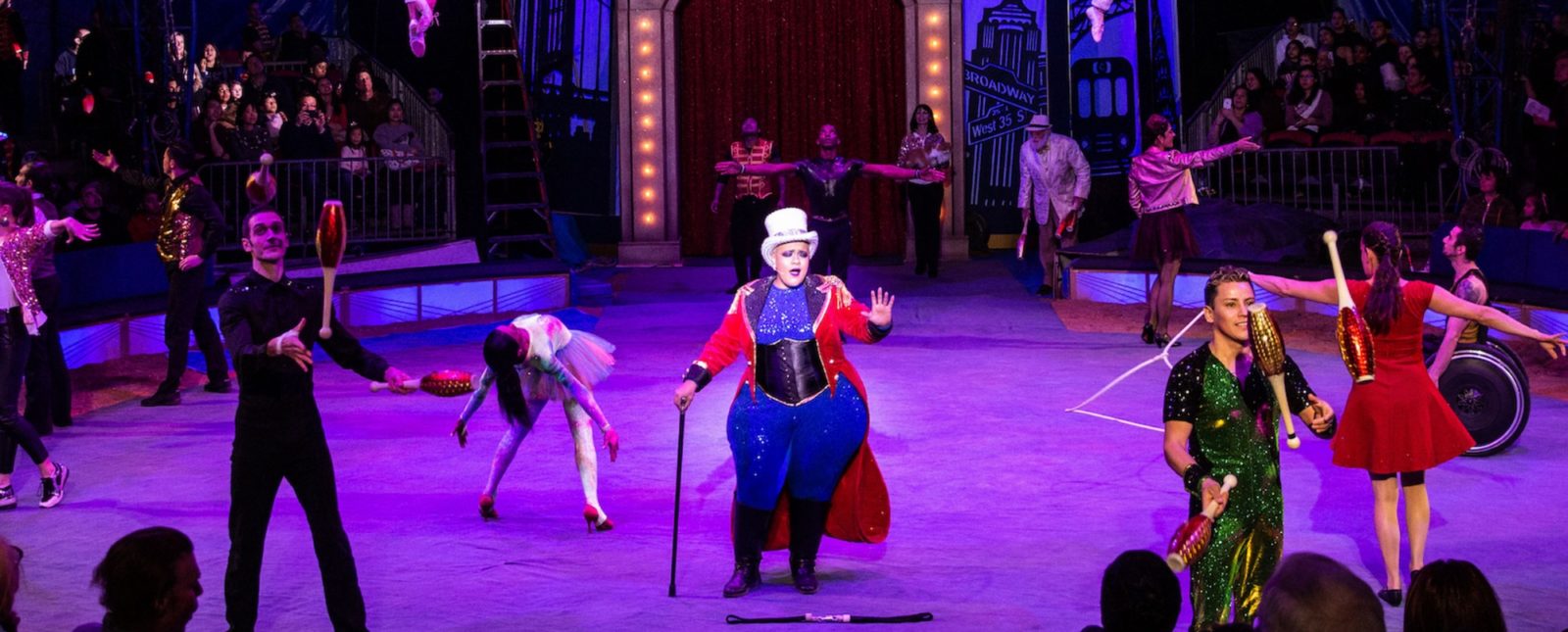American Circus Finally Has an Advocacy Organization: The Birth of ACA
To weather the impacts of COVID-19 on the circus industry, community members across the U.S. came together and created the American Circus Association (ACA), a diverse volunteer network that advocates the legal and cultural recognition of circus arts. Now they’re working to advocate for the American circus on the political stage.
While most countries have their national circus arts advocacy organizations, the United States of America didn’t have one of its own until recently. Before COVID-19 began, the closest equivalent to it was the American Youth Circus Organization (AYCO), founded in 1998 with a mission to promote the participation of American youth in circus arts and support circus educators. While AYCO has met success in advocating to expand circus arts programs across the country, there was, as yet, no organization whose focus was as broad as the whole sector’s needs.
It was in the spring of 2020 that the ravages of the pandemic gave America’s circus industry the final push it needed to come together. As show closures and cancellations swept live entertainment venues like the waves of a hurricane, practitioners of American circus connected over Zoom calls to talk about and strategize against the issues plaguing them, sharing their stories and their resources. The effect it had was almost paradoxical: amidst industry standstill and quarantine, these practitioners felt more unified than ever. Together, they felt ready to fight for the future of their community. And with that, the American Circus Alliance (ACA) was finally born.
Though only formally established in 2021, the ACA was built in answer to a need long-recognized and broadly felt within the nationwide circus community: creating an advocacy organization to speak for the entire sector. Before the ACA, the American circus community had often interacted with each other as though they were performing in separate rings under one tent. The ACA, instead, provides a one-ring stage that’s wide enough to encompass everyone involved in circus.
Current ACA leadership consists of volunteers who run the gamut from contemporary companies to traditional families; from performers to producers, researchers, educators, and circus institutions; it enfolds people and practices as diverse as the American circus spectrum itself. United in their belief of equity, inclusion, and justice for the entire community, ACA encompasses all members of the circus community and stands together under the Big Top of an old motto borrowed from circus history: “with it and for it.”

To that end, the ACA’s self-structuring works to address both the needs of its community members and the community as a whole. Monthly industry expert-led workshops, meetings, and newsletters allow members to get together, hold discussions, and circulate information and resources. In issue-focused subcommittees, members also get to tackle specific needs identified by the community.
Acting on a wider scope is the ACA Advocacy Committee, a shared voice for the circus community, which has already run four nationwide campaigns to garner recognition for and bring relief to a sector still reeling in the wake of COVID-19.
Committee leaders rolled out the first of those campaigns in the form of a survey measuring the pandemic’s economic impact on the circus industry. Circus volunteers have also raised legislators’ awareness of circus arts in the USA through partnering with the #BeAnArtsHero campaign, a grassroots advocacy effort petitioning U.S. Senators to grant relief to arts sectors. As well, their overwhelming response to the National Endowment for the Arts (NEA)’s request for feedback on its 2022-2026 strategic plan helped them secure a pledge from the NEA Director of Multidisciplinary Works to bolster the circus arts within their future programming. ACA volunteers also made circus voices heard before members of Congress through testimonials submitted for the landmark House hearing, ‘The Power, the Peril, and the Promise of the Creative Economy,’ on January 19th.

Ongoing advocacy efforts mark the volunteer-led organization’s continued dedication to fighting the good fight for American circus. ACA advocates are hard at work to secure recovery for the industry through making themselves visible in Washington, D.C., reaching out to the offices of U.S. legislators. In gaining an ear with members of Congress, particularly Republicans, they hope to bolster circus arts awareness and build enough bipartisan support to pass the Creative Economy Revitalization Act (CERA), which, if approved, would secure $300 million in funding for live entertainment and the arts. Further down the line, member efforts to bolster circus’ profile among legislators may move Congressmembers to grant circus arts formal recognition as an Art Form under the NEA, which would pave the way for further institutional support.
Recently, we had a chance to sit down with Shenea Stiletto, a circus performer and two-time World Champion Gold Medalist in Acrobatic gymnastics, USA Gymnastics Hall of Fame Member, and World Acrobatic Society Inductee, about her involvement with the ACA Advocacy Committee. We asked Shenea about the conversation she initiated with representative’s office through the template prepared by the arts worker’s advocacy initiative #BeAnArtsHero.

Carolyn Klein: Tell us about your conversation with representatives. How was the conversation initiated, and who participated?
Shenea Stiletto: I contacted my state representative through the appropriate online portal provided. Additionally, I included my own understanding of working with legislators by adding important language, based upon my decade of advocacy on behalf of youth sports in connection with being a Survivor of USA Gymnastics. I’m based as a circus artist in Los Angeles, CA, so I reached out formally to California Senator Alex Padilla, who also happens to be a prominent co-sponsor of the CERA bill, or the Creative Economy Act. The CERA bill is an important initiative for circus workers to get behind, as it would produce $300 million in funding for live entertainment and the arts.
As part of the American Circus Alliance Advocacy Committee, I, along with Committee co-chairs Ariele Ebacher, and Aloysia Gavre, and ACA Co-Chair Mark Lonergan, participated in the meetings. We had one conversation with each representative’s office. It took months to receive a response from Senator Padilla’s office, which is standard. However, I want to stress the importance of contacting our legislators through such means of action; it does work, and this is invaluable evidence of that, coupled with the progress we made with each conversation that followed.
The subsequent meetings were with the office of New Mexico Senator Ben Lujan, who himself introduced the CERA bill into the Senate. Our most recent meeting was with Rhode Island Senator Jack Reed’s office. Senator Reed is an incredibly important supporter of the Arts, as he co-chairs the Congressional Arts Caucus, which allows Congress members interested in the arts to influence arts legislation and promote the National Endowment for the Arts (NEA).
CK: What were the main issues that you wanted to bring to the table?
SS: One main issue we wanted to bring to the table involved the passage of the CERA bill, which was recently included in President Biden’s Build Back Better Act– which did not get passed, unfortunately, due to a lack of Republican support.
We are also strong supporters of having Circus recognized as an Art Form by the NEA, which would require an act of Congress. This recognition would not only elevate circus to the level of the other major performing arts fields, but would legitimize the art form for funders state, local, and private to follow suit. That’s the first step in this process— one that would have a domino effect across the country for further recognition and funding specific to our industry. Senator Reed’s influence, as mentioned, would be very beneficial in seeing this through.
As a committee, we also asked how we could support each Senator in their efforts to have the CERA bill pushed through, and how we may mobilize the ACA’s members in order to do so.
CK: What reassurance did you get from the representatives?
SS: We received positive reassurance from the representatives. They were very open to connecting us with different representatives who are themselves connected to the issues we brought to the table, and we owe our continual meetings to each office’s recommendations and formal introductions. This was the first time that each office had ever had the opportunity to speak directly with the circus community and gain an understanding of our unique needs as the Circus Arts.
It cannot be stressed enough how important the support and positive interest we have received from each representative’s office is. Not only were these meetings historic, they have most certainly paved the way for us to maximize the Circus Arts’ influence and legislative power in Washington, D.C.
CK: What are the next steps?
SS: We have been working diligently within the ACA Advocacy Committee in an effort to follow the advice of each representative’s office. They were incredibly specific about the fact that the bills the Circus Arts so desperately needs must have Republican support to be fully actualized. The ACA has been actively engaging with its members who are constituents in Republican states, and the Committee itself is reaching out quickly and directly to as many Republican representatives as we possibly can.
The Advocacy Committee is continuing to nourish our relationships with each representative’s office, and focusing specifically on how best to harness the collective power of the ACA membership to educate and spread the word throughout the American Circus community, that we have a level of visibility within Washington D.C unlike anything we have ever had before. It is our current and ongoing effort to stress how important it is for us to stay engaged and continue to make our voices heard as an industry to get legislation passed and gain NEA recognition through Congress.
Meanwhile, there was another milestone event for the art sector in America. On January 19th, for the first time in American history, Congress had a hearing on the devastating state of the Arts & Culture sector. What do you think this hearing means for American circus specifically, and how does this particular hearing directly or indirectly support the advocacy work that the ACA has started?
The hearing on the Power, Peril, and Promise of the Creative Economy was an important opportunity facilitated by the tireless work of the #BeAnArtsHero campaign. They have made it their mission to represent Arts Workers, and specifically allow for the Circus Arts as represented by the ACA to participate in an equitable way. The hearing was an opportunity for Circus Workers to tell Washington what type of impact the last two years have had on their lives and careers, and what they can do to support our industry as we navigate these difficult times with such vast uncertainty perpetrated against the live entertainment sector.
CK: Lastly, what is your hope for the American circus?
SS: Our hope is for American Circus to succeed in obtaining more legislative power and rights in Washington D.C. As a sector, we have often been treated as an afterthought, or overlooked on an individual level. The American Circus has deep roots within the fabric of our society; it has given rise to the evolution of many other performing arts sectors, and we deserve individual representation on a lawful level.
The Circus Arts need prominent voices that will help us to secure a safety net respecting the billion dollar-generating industry that Circus is— an industry that only continues to get stronger year after year. Those who have given their lives to circus are not only equal to workers in other industries, they have uniquely survived and adapted to the unimaginable for generations. We firmly believe that the exploitation of circus by means of excluding it from formal recognition as an Art Form should end, and that, through advocacy efforts on behalf of American Circus workers, and in our rightful place with access to lawmakers with direct impact on our means to make a living, our sector will be amplified and solidified in a legitimate way.
***
Since its formal launch in 2021, the ACA has opened its membership to the public, and they encourage the American community to join and unite! To preserve the ethos and values of the organization and the circus community at large, members are required to read and agree to follow a code of ethics designed to facilitate a spirit of mutual respect and collegiality. To address identified needs within the circus community, member-formed committees continue to do a great deal of work, both within the organization and on the national stage. Taking a cue from other nationwide arts organizations, the ACA tries to balance both the immediate needs and desires of its members with long-term advocacy goals and projects. By acting together, and with enough hard work, the ACA community can help each other build a resilient and thriving circus ecosystem in the United States.
Main image: Courtesy io ACA
.
...Do you have a story to share? Submit your news story, article or press release.



